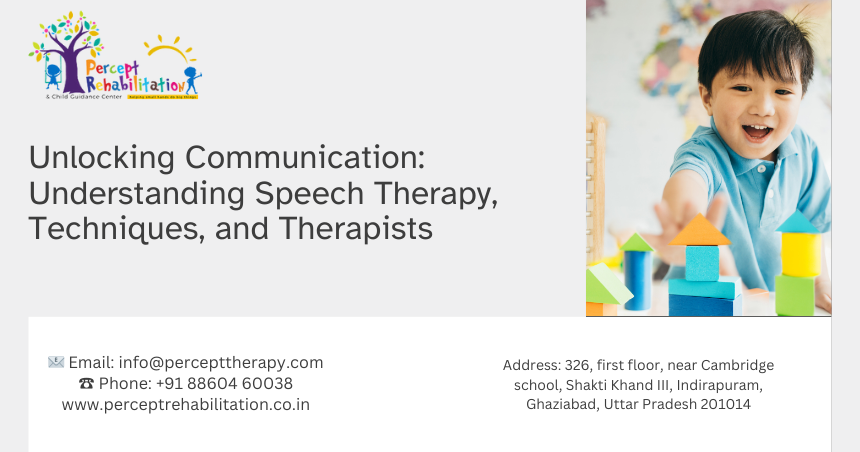Speech and language development is one of the most fundamental aspects of a child’s early growth, shaping their ability to communicate, socialize, and learn. For toddlers, the first few years of life are a crucial time for developing these skills. During this period, children absorb an enormous amount of information, learning to understand and produce sounds, words, and sentences. However, some children may face challenges in speech development, making early speech therapy a critical intervention.
The Importance of Early Speech Development
Speech and language skills are the foundation for almost every aspect of a child’s growth, including cognitive, social, and emotional development. By the age of 3, toddlers typically begin to expand their vocabulary and use simple sentences. They also start to engage in conversations, understand social cues, and express their needs, feelings, and thoughts. This stage is pivotal in their journey toward becoming effective communicators.
Early speech development is also closely tied to academic success. Children who struggle with communication in their formative years are at a higher risk of experiencing difficulties in reading, writing, and understanding instructions once they begin formal education. The ability to process and articulate thoughts clearly is crucial for school readiness, socializing with peers, and even building self-esteem.
Recognizing Delays and Disorders in Toddlers
While all children develop at their own pace, some toddlers may experience speech delays or disorders that can hinder their communication development. These delays can result from various factors, including genetic, environmental, and medical reasons. Here are a few common signs that may indicate the need for early speech therapy:
- Limited Vocabulary: By age 2, toddlers should be using simple words and phrases. If a child isn’t speaking much or seems to have a very limited vocabulary compared to peers, it could be a sign of a speech delay.
- Difficulty Pronouncing Words: While mispronunciations are common in young children, toddlers should be able to pronounce simple words clearly. Persistent issues with speech clarity, especially when they hinder understanding, may require professional assessment.
- Problems Understanding Language: A toddler’s ability to understand simple instructions (like “come here” or “give me the ball”) should be developing at this age. If a child struggles to comprehend basic words or commands, it may suggest a language delay.
- Lack of Social Communication: If a child is not engaging in verbal or non-verbal communication (such as pointing, gesturing, or making eye contact), this could indicate an issue with language development.
- Stuttering or Disfluency: While many children go through phases of disfluency, consistent stuttering or difficulty with fluency can be a sign of a more significant speech issue that requires attention.
Benefits of Early Speech Therapy for Toddlers
When speech and language difficulties are identified early, toddlers have the best chance of catching up with their peers. Early speech therapy is a structured, evidence-based approach to addressing these issues before they become ingrained. Here are several key benefits of early intervention:
Improved Communication Skills
The most obvious benefit of speech therapy is improved communication. A speech therapist works with the toddler to improve their ability to express themselves clearly and to understand others. This is achieved through activities designed to strengthen their vocabulary, sentence structure, and pronunciation. For children who are non-verbal, speech therapy can also introduce alternative communication methods, such as sign language or communication devices.
Enhanced Social Interaction
Children who have difficulty communicating often find it hard to interact with their peers. They may struggle to make friends or participate in group activities, leading to social isolation. Early speech therapy helps toddlers build the skills they need to engage with others in social settings. Being able to speak clearly and understand others’ speech fosters better peer relationships, boosting the child’s confidence in social environments.
Academic Readiness
Effective communication is key to a child’s success in school. Toddlers who receive early speech therapy are better prepared for academic learning, as language is the primary medium for teaching and learning in the classroom. When children can understand instructions, ask questions, and express their ideas, they have a strong foundation for future learning.
Reduced Emotional and Behavioral Issues
When toddlers struggle to communicate, they often experience frustration and anxiety. They may resort to behaviors like tantrums or aggression as a way of expressing their needs. Early speech therapy can help alleviate these emotional challenges by equipping children with the tools they need to express themselves verbally. As a result, they are less likely to become overwhelmed by their inability to communicate.
Prevention of Long-Term Speech Problems
Addressing speech and language issues early can prevent them from becoming more ingrained and difficult to treat later on. If left unaddressed, minor delays can develop into more significant problems, including learning disabilities, behavioral issues, and difficulties with reading and writing. Early intervention is a proactive approach that can significantly reduce the likelihood of these long-term consequences.
How Early Speech Therapy Works?
Early speech therapy for toddlers typically involves one-on-one sessions with a licensed speech-language pathologist (SLP). The SLP will evaluate the child’s speech and language abilities through play-based activities, observation, and parent interviews. The therapist will then design a personalized treatment plan to address the child’s specific needs.
Some common techniques used in early speech therapy include:
- Interactive Play: Play is a critical component of early speech therapy. By engaging in structured play, the therapist encourages the child to use language in a fun and natural setting.
- Modeling and Imitation: The therapist will model correct speech sounds, words, and sentences for the child, encouraging them to imitate and practice.
- Visual Aids and Gestures: For toddlers who struggle with verbal communication, visual cues and gestures can be helpful in reinforcing understanding.
- Family Involvement: Parents play a vital role in the speech therapy process. The therapist will often provide parents with strategies and exercises to do at home, ensuring that progress is made outside of therapy sessions.
Conclusion
Early speech therapy for toddlers is a vital part of their overall development. It not only helps children develop essential communication skills but also improves their ability to socialize, learn, and express their emotions. Identifying speech and language delays early on and seeking professional help can make a significant difference in a child’s future. With the right intervention, toddlers can overcome communication challenges and thrive in their academic, social, and emotional lives. If you notice any signs of speech delay in your toddler, don’t hesitate to consult a speech therapist—early intervention can set the stage for a lifetime of successful communication.




